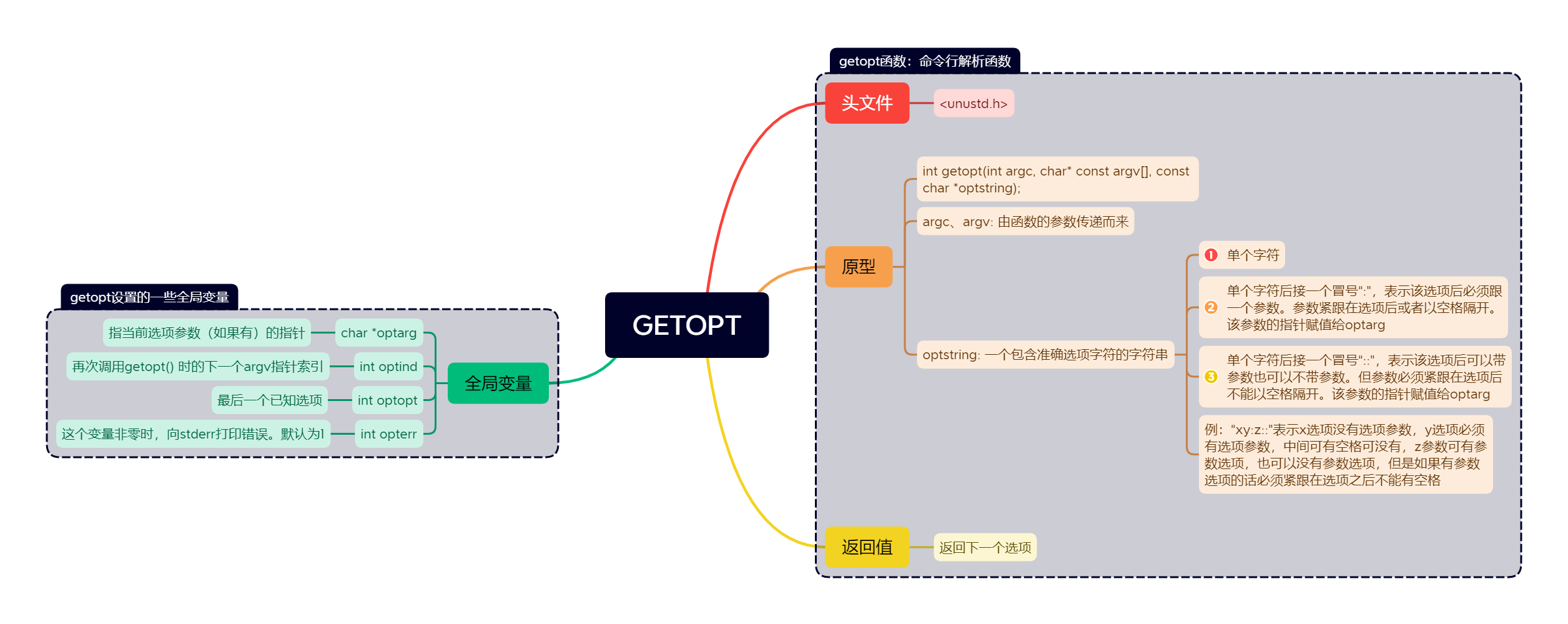函数API

getopt()
1
2
3
4
5
6
7
8
9
10
11
12
13
14
15
16
17
18
19
20
21
22
23
24
25
26
27
28
29
30
31
32
33
34
35
36
37
38
39
|
#include <stdio.h>
#include <unistd.h>
#include <stdlib.h>
int main(int argc, char **argv) {
int opt;
int a_flag = 0, l_flag = 0;
printf("argc = %d\n", argc);
while((opt = getopt(argc, argv, "alm:o::")) != -1) {
switch(opt) {
case 'a':
a_flag = 1;
break;
case 'l':
l_flag = 1;
break;
case 'm':
printf("msg = %s\n", optarg);
break;
case 'o':
printf("opt = %s\n", optarg);
break;
default :
fprintf(stderr, "Usage : %s -al\n", argv[0]);
}
}
printf("optind = %d\n optopt = %c\n", optind, optopt);
return 0;
}
|
- getopt函数的第三个字符串参数 “$alm:o::$”:在man page中这样解释为:**-al 不用一个关联值;-m 需要有一个关联的value参数;-o 可以加一个关联参数也可以不加**。
运行结果:
1
2
3
4
5
| ➜ test ./a.out -t //首先 -t 是一个非法的选项
./a.out: invalid option -- 't' //输出错误信息,因为非法选项
optind = 2 //此时argv[optind]是我们的操作数,也就是我们传递给主函数的参数
optopt = t //当发现无效项字符时,optopt会包含该字符,正如我们传递的‘a’这个无效项。
opterr = 1 //opterr变量非零,getopt()函数为“无效选项”和“缺少参数选项,并输出其错误信息。Usage : ./a.out -al
|
再次运行:
1
2
3
4
5
| ➜ test ./a.out -m //根据getopt函数的第三个参数,因为‘m’字符后有‘:’冒号,因此在‘-m’选项后需要跟随一个参数。因此此次运行的错误为“缺少参数”,如下提示:
./a.out: option requires an argument -- 'm' //输出了错误信息,因为“缺少参数”
optind = 2 //argv[optind]为空,因为此次运行没有传递参数
optopt = m //当发现无效项字符时,optopt会包含该字符,正如我们传递的‘t’缺少参数的选项。
opterr = 1 //opterr变量非零,getopt()函数为“无效选项”和“缺少参数“选项,并输出其错误信息。Usage : ./a.out -al
|
再次运行:
1
2
3
4
5
6
| ➜ test ./a.out -al -m 123 -o //‘-al’不用加参数,‘-m’需要加参数,‘-o’可加可不加, 向main函数传递参数叫123、456
argc = 5 // 字符串长度
msg = 123
opt = 456
optind = 5 // 字符串长度
optopt =
|
外部变量
optind、opterr、optopt、optarg、errno
都在某个.c文件中定义的,所有现在能用,可能是外部变量、可能是静态全局变量… …
a.c
1
2
3
4
5
6
7
8
9
10
| #include <stdio.h>
void input();
extern int age;
int main() {
input();
printf("ttw age : %d \n", age);
return 0;
}
|
b.c
1
2
3
4
5
6
7
8
9
| #include <stdio.h>
int age;
void input() {
printf("Please input you age:\n\t");
scanf("%d", &age);
return ;
}
|
运行结果
1
2
3
| Please input you age:
14
ttw age : 14
|











